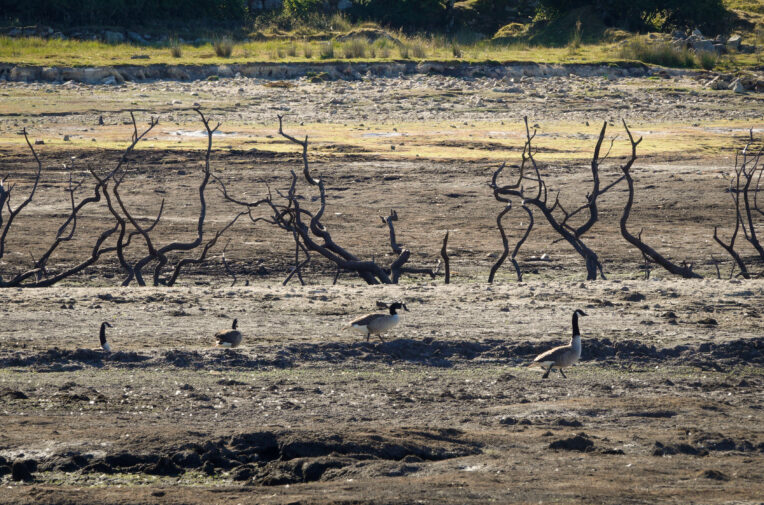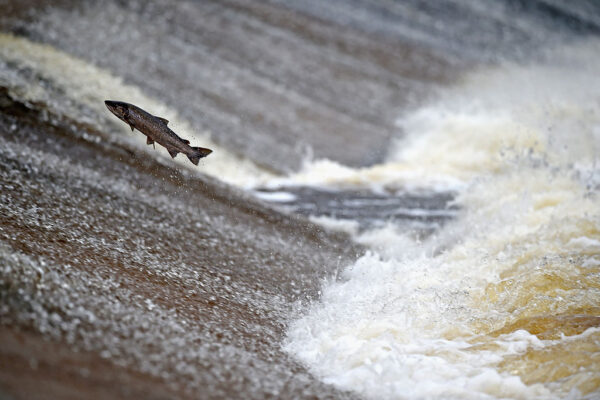
Birds walk past old tree skeletons, exposed during the 2022 drought, at Colliford Lake in Cornwall. The reservoir, managed by South West Water, hit a record low. Photo: Matt Cardy/Getty
South West Water was ‘not honest’ about drought risk to water supplies, Environment Agency said
The company was ‘not well prepared’ for 2022’s drought and did not understand its own supply system, the environmental regulator told Ofwat
South West Water was ‘not honest’ about drought risk to water supplies, Environment Agency said
The company was ‘not well prepared’ for 2022’s drought and did not understand its own supply system, the environmental regulator told Ofwat
Birds walk past old tree skeletons, exposed during the 2022 drought, at Colliford Lake in Cornwall. The reservoir, managed by South West Water, hit a record low. Photo: Matt Cardy/Getty
South West Water was inadequately prepared for the record-breaking heatwave that hit England in 2022 and was “not honest” with regulators about the risk a drought posed to the company’s water supplies, according to an Environment Agency (EA) assessment obtained by Unearthed.
The environmental regulator told counterparts at Ofwat that South West Water (SWW) had shown “complacency” prior to the drought and “a lack of understanding of their own supply system”.
“SWW were not honest, open and transparent with regulators about their drought projections and potential risks to security of supply,” the EA wrote in a July email to the watchdog for the privatised water companies.
The email, obtained by Unearthed under freedom of information laws, said “SWW acted too late” in response to the drought, and that this “presented a genuine risk of loss of supply in West Cornwall”.
This lack of preparation and planning by the company, which provides drinking water for around 3.5 million people across the southwest of England, had “a huge impact” on staff resources at the EA and “undoubtedly” had an impact on customers and the environment, it added.
The revelations come after Pennon Group, the listed company that owns SWW, increased its interim dividend to shareholders by 8.3% last autumn, despite the water company reporting a fall in profits and receiving a record fine for illegal sewage pollution. SWW is also being investigated by Ofwat over the accuracy of its leakage and consumption data.
Charles Watson, chair of campaign group River Action, said the documents obtained by Unearthed were “pretty devastating” and “call into question the very competence of the organisation”.
“The water industry is facing a complete crisis, which is the result of years of chronic underinvestment in order to produce dividends for shareholders,” he said. “Now the consequences of this are staring us in the face in these documents.”
The SWW Drought Plan was found to be not ‘drought-ready’ – Environment Agency
A SWW spokesperson said: “We strongly reject any suggestion that we were not adequately prepared for the risk of drought or that we did not operate in good faith with the regulators.
“Despite facing a once-in-a-generation drought in the South West, no customer went without water supply and we successfully maintained a robust supply of water to over 3.5 million customers and 10 million visitors to the region.”
England’s privatised water companies have come under increased public scrutiny in recent years, as a result of sustained pollution incidents, spiraling debt and dividends.
An Ofwat spokesperson told Unearthed: “South West Water was undoubtedly underprepared for the drought in 2022. They have since taken urgent action and have invested significantly to ensure better future resilience.”
‘Not drought ready’
In August, an Unearthed investigation revealed that parts of England almost ran out of water during the drought in 2022, which was the UK’s hottest year on record. The EA warned that some water companies – Southern Water and Yorkshire Water – might break the law to keep the taps running. Meanwhile, three of SWW’s reservoirs hit record lows.

Professor Hannah Cloke, a hydrologist at the University of Reading, told Unearthed that the 2022 drought was “a big red flag that we are not adequately prepared for the impact of climate change on our water supplies in the UK.”
“I find it quite astounding that here we have evidence that no one at SWW was taking the situation seriously until it had got to crisis point,” she said.
SWW’s spokesperson said the company “reacted well” to the drought, and continues “to review all plans regularly to prepare for any future climate change impacts to water resilience”. He added: “South West Water strongly disagree with any suggestion that it had not adequately prepared for the risk of a drought.”
But the documents newly obtained by Unearthed show that the EA did not share this analysis. The environmental regulator told Ofwat that SWW’s drought plan prior to the 2022 heatwave was “not ‘drought ready’”. This meant that new water sources and permits had to “be considered, applied for and permitted during the drought instead of planned in advance.” It added that the company had “not adequately managed consistently increasing demand in the years prior to the drought”.
Drought permits are emergency measures that allow companies to abstract more water or restrict water releases back into rivers or lakes. The EA granted SWW seven drought permits, out of 32 it issued in total to England’s water companies in 2022-23.
James Overington, water policy officer at campaign group Wildfish told Unearthed that the extra water SWW removed from rivers and lakes using these permits was “likely to have negatively impacted protected sites and species.”
The rivers of southwest England are home to Atlantic salmon, which was declared at risk of extinction in December. Overington said that SWW’s drought permits would have “exacerbated” the impact of the drought on the species’ migration.

200 million litres
The EA told Ofwat that before the drought SWW showed “a lack of understanding of their own supply system, considering themselves as a potential water donor in the future, only to find the reverse is true.”
Prior to the 2022 heatwave, SWW’s long-term water management plan anticipated that it would have enough water to be able to donate supplies to neighbouring companies experiencing shortages.
By contrast, its latest plan states that it needs to close a gap of over 200 million litres of water per day by 2050 in order for supplies to meet demand.
In February 2023, SWW published a new draft water management plan, setting out how it intended to maintain water supplies for its customers between now and 2050. However, the company was forced to redraft the document, and run a second public consultation just months later, after the EA called for “substantial changes” to the plan.
In a briefing for environment minister Rebecca Pow written last year, the EA wrote that the company’s earlier draft was “not fit for purpose” and the regulator did not “have confidence that this plan could be used to provide a secure supply of water that sufficiently protects the environment over the next 25 years”.
Ofwat’s spokesperson told Unearthed: “In Spring 2023, as part of the water resource management plan process, we identified areas for improvement and look forward to this being incorporated in the final version, due for publication in 2024.
“The region is now in recovery from drought and the company must continue to closely manage its water resource position.”
The EA has warned that England is set to run short of water by 2045, due to climate change and population change.
“The costs of getting it wrong are so mind-bogglingly huge that we really ought to see if there is a better way we could be managing our water system,” Cloke told Unearthed.
“We need to find ways to invest more in the necessary infrastructure to secure the supplies we need, as we experience longer and more intense droughts. We need to make radical steps to make our homes and businesses more water efficient, to reduce demand.”
No new reservoirs have been built in the UK in the last 30 years and water companies have made limited progress in reducing leaks and keeping up with demand reduction targets, according to the latest adaptation report published by the Climate Change Committee (CCC), the government’s statutory climate advisor.
Baroness Brown, chair of the CCC’s adaptation committee told Unearthed: “Despite some positive action on planning for climate change in the water sector, implementation action has not kept pace. A step-change is needed in delivery against targets and plans across the country as the risk of more extreme drought conditions rises over time.”
An Environment Agency spokesperson told Unearthed: “We expect water companies to have clear drought plans in place to ensure water supply can meet demand and we will not hesitate to take action when we have concerns.
“Since the onset of drought in 2022 we, along with Ofwat, have worked with South West Water to ensure they have robust plans in place to recover from the drought and to improve the resilience of our supplies so they are prepared for the effects of a changing climate.”




